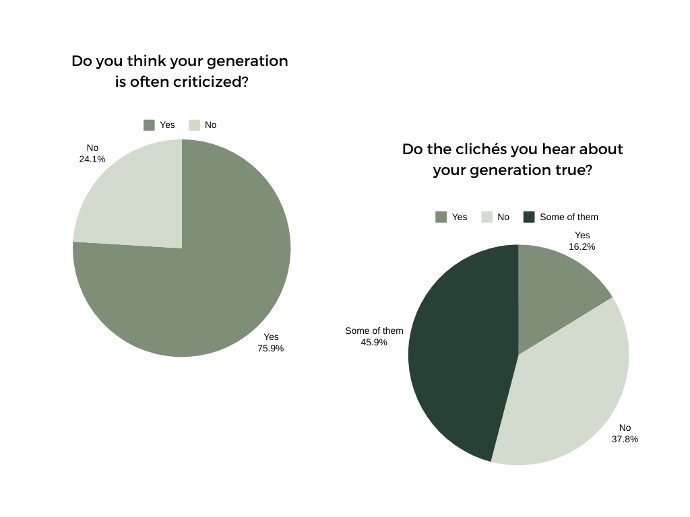Generations, what an interesting and huge topic! Have you ever wonder how each generation sees yours? What clichés represent each generation? Or what makes your generation different from the others?
Quick definition
Firstly, we’re going to start with a little definition.
Generation: noun /ˌdʒɛnəˈreɪʃn/
- all the people who were born at about the same time (Oxford Learner’s Dictionaries)
- a group of people who are about the same age within a society or within a particular family (Cambridge Dictionary)
What we learn from this is that a generation is defined by a period of time and that there are different generations. In fact, since the first world war, we are now in our fifth generation. Here is how these generations are divided and their names.
Silent
generation
Baby
Boomers
Gen
X
Gen Y / Millenials
Gen Z
Gen
Alpha
Generational clichés
Every generation criticizes the previous one and the following one. Yet 1 out of 5 people are mistaken about the generation they think they’re in. For each generation, a set of clichés is often brought up in conversation, either to criticize or to make a generalization.
Baby boomers and Gen X are often seen by the younger generations as the old, closed-minded, conservative people who only live for their work. While they think that their generation was the best one because they were more resourceful and grew up without the help of technology as we know it now. They are not good listeners and are bad at communicating, as talking about one’s feelings is considered weak.
Gen Y is seen as the transitional generation between Gen X and gen Z. They are seen as more open-minded and more attentive then gen X and baby boomers. But they work as hard and are as pragmatic as them. They are also seen as big consumers with a lot of trauma that comes from previous generations. However, along with Gen Z, they are described as passionate and rebellious in the way that they want to make a change.
 *2 graphs from a poll made in 2024
*2 graphs from a poll made in 2024Gen Z is seen as the “always tired” and “always complaining” generation. Gen Z is a generation in revolt, always manifesting as if it was an extra-curricular activity. Along with the alpha generation, they are described as the lost generation. The previous generation see Gen z and gen alpha as a generation that can’t get off their phones and that lives in a virtual world with the rise of social medias.
Gen alpha is seen as a generation that wants to grow up and become adults too quickly. For the previous generations, they don’t have any critical thinking as they depend on social media. A generation of know-it-alls. But as they are still young, we should wait a few years and see what they’ll be able to bring to our society. We might be surprised by it.
As clichés
might offend every generation, we need to keep in mind that most of them are
true, and we should reflect on our own generation’s clichés before criticizing
the other generations. The best way to understand one another is to communicate
and, most importantly, listen without invalidating one’s saying or feelings.
Generational values
After making a little poll to ask people what values describe their generation the most, here’s what came out.
Baby boomers value work/career, ambition and ownership. Ownership is a value that baby boomers and Gen X share. Gen X differentiates itself by valuing family, discipline and leadership. The family value was passed down to the millennials, even if it’s not the same perception of it. Millennials also value discovery, communication and adaptability. Gen Z also values communication and adaptability, along with self-care, but what they value the most is diversity.
Even though each generation’s way of thinking is different and their views on what’s important in life differs, they share a lot of the same values but on a different scale. For example, they all value change, independence and sharing. Each generation wants to change the world for the better in their own way. They want to be independent in their choices and lives. And finally, sharing is a value that everyone has been taught since birth. Just by sharing our experiences with people, we make society go on. That’s how friendships are born. We were also taught that when it is possible, we can share with people in need. Being able to share our emotions so people can understand what we’re feeling. There are a lot of sides to sharing, and that’s why it's a fantastic value.
_________
References
- « Generation », https://dictionary.cambridge.org/dictionary/english-french/generation.
- « Generation ». In Wikipedia, https://en.wikipedia.org/w/index.php?title=Generation&oldid=1226475146.
- « generation noun - Definition, pictures, pronunciation and usage notes | Oxford Advanced Learner’s Dictionary at OxfordLearnersDictionaries.com ». https://www.oxfordlearnersdictionaries.com/definition/english/generation?q=generation.
- Jenkins, Ryan. « Generation Z vs Millennials: The 8 Differences You Need to Know ». https://blog.ryan-jenkins.com/generation-z-vs-millennials-the-8-differences-you-need-to-know.
- Landecy, Clara. « Baby-boomers, générations X, Y, Z et Alpha : qu’est-ce qui les distingue ? » https://blog.hubspot.fr/marketing/baby-boomers-generations-x-y-z-alpha.
- Parents. « Your One-Stop Guide to Every Generational Label ». https://www.parents.com/parenting/better-parenting/style/generation-names-and-years-a-cheat-sheet-for-parents/.
- « The Generations Defined - McCrindle », 15 octobre 2021. https://mccrindle.com.au/article/topic/demographics/the-generations-defined/.